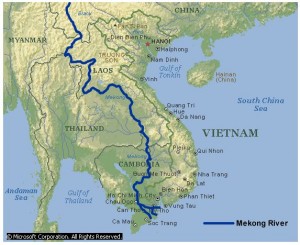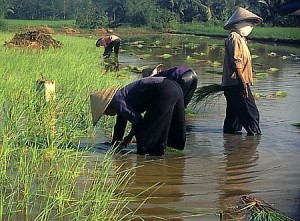Rice, Rivers and Resiliency in the Face of Climate Change
Jul 17th, 2013 | By admin | Category: Climate ChangeBy Suzanne York, www.howmany.org
The word “resilience” is being thrown around more and more these days, often taking the place of the overused “sustainability.” Yet both words are critical as the world faces increasing threats of climate change and ways to adapt to it.
The Mekong River Basin isn’t in the news much, yet a couple of recent reports underscore how vulnerable the river basin countries are to climate change and the threat it poses to livelihoods and the ecosystem.
Last month, the World Bank released Turn Down the Heat: Climate Extremes, Regional Impacts, and the Case for Resilience, that found that the consequences of climate change are being felt on every continent and every sector. For South East Asia in particular, its river deltas “are expected to be impacted by projected sea-level rise and increases in tropical cyclone intensity.” This will put rural and urban people at greater risk to floods, saltwater intrusion, and coastal erosion.
The Importance of the Mekong River
The Mekong River Basin is home to some 60 million people, where nearly 80 percent depend upon the river waters. Unsurprisingly, fish is a major food source –providing 50 to 80 percent of daily consumption.
According to another report released in June called Mekong Adaptation and Resilience to Climate Change (Mekong ARCC, a project partly funded by USAID), “The Mekong’s vast ecosystem and species diversity underpins a wide variety of livelihoods and is the foundation for food security in rural communities which make up about 85% of the basin’s population.” The paper also found that food demand in the region will continue to rise as populations grow and diets change.
Vietnam and the Mekong River: A Closer Look
The Mekong River Delta is called the rice bowl of Vietnam. Over 16 million people live in this low-lying delta, and have relied on the natural cycle of floods and tides for harvests.
Rising sea-levels will have a big effect rural fisherfolks and communities, and natural resources are essential to rural livelihoods. Almost 80 percent of Vietnam’s population is rural, and women make up 53 percent of the farming population.
Agricultural production – especially of rice – is vulnerable to sea-level rise. The Mekong Delta accounts for 60 percent of Vietnam’s rice production and makes up a majority of its exports. The World Bank report estimated that a 30 centimeter sea-level rise (which could happen as early as 2040), could result in the loss of about 12 percent of crop production due to inundation and saltwater intrusion.
Even prior to the latest report, the World Bank recognized Vietnam among the countries most threatened by rising waters brought about by higher global temperatures, noting that rising sea levels could leave a third of the Mekong Delta underwater and lead to mass internal migration and devastation.
In 2011, Tran Thuc, director general of the Vietnam Institute of Meteorology, Hydrology and Environment told the UK Guardian that “If there was a one-meter rise, we estimate 40% of the delta will be submerged.”
One solution found in the Mekong ARCC report is to strengthen natural coastal protection from inundation through community-based rehabilitation and protection programs, especially of mangroves (much of Vietnam’s mangroves have been destroyed over the last several decades, putting the Mekong Delta at greater risk of typhoons and erosion).
Governments and global society need to help the people and communities of the Mekong River Delta adapt to climate change impacts and provide sustainable livelihoods as the ecosystem they highly depend upon changes. Resiliency only goes so far without real support that benefits communities and the environment.
Suzanne York is a senior writer with the Institute for Population Studies.
[photo credit: http://greendiscoveryindochina.com/wp-content/uploads/2013/03/Mekong-life3.jpg]


